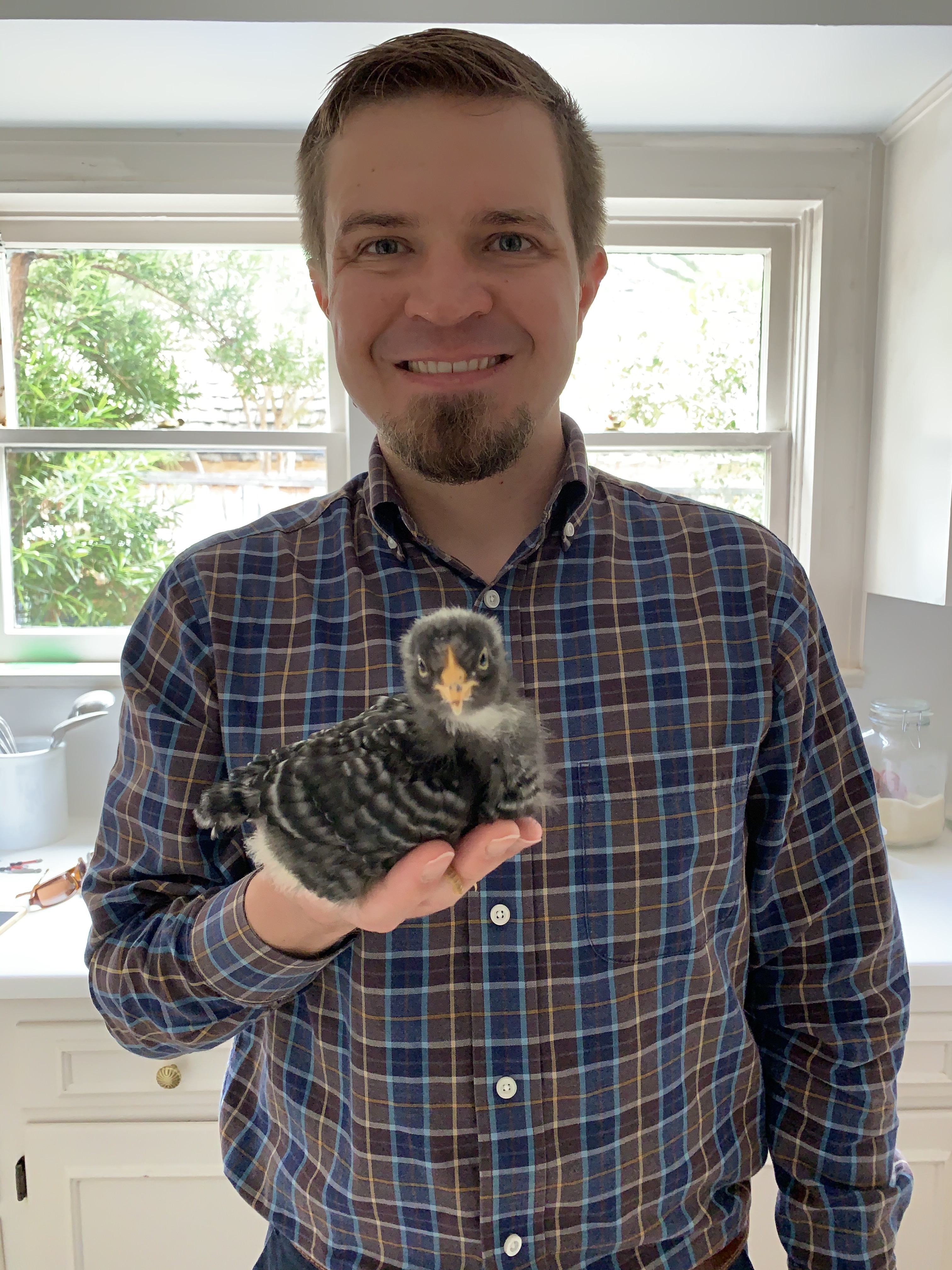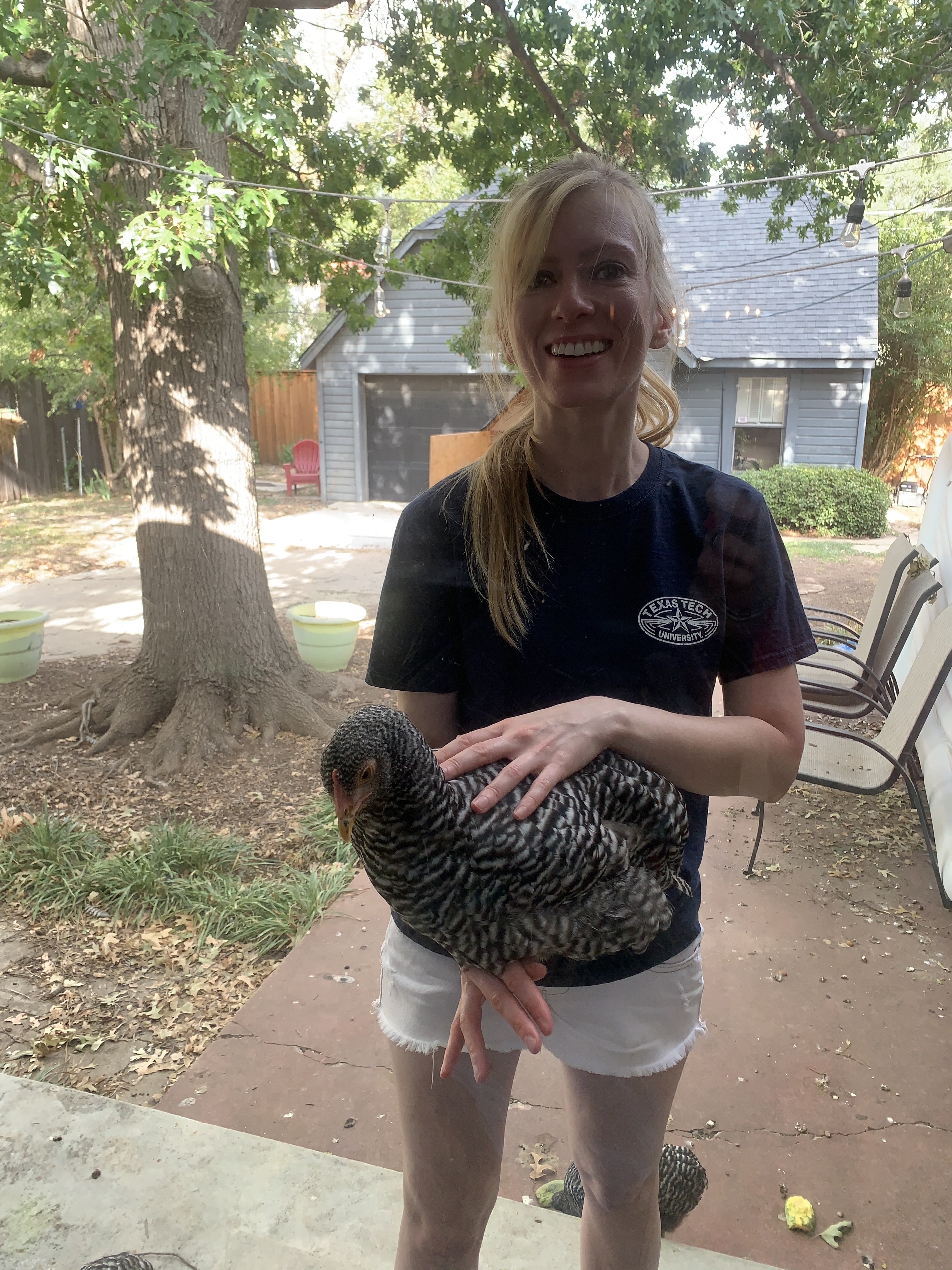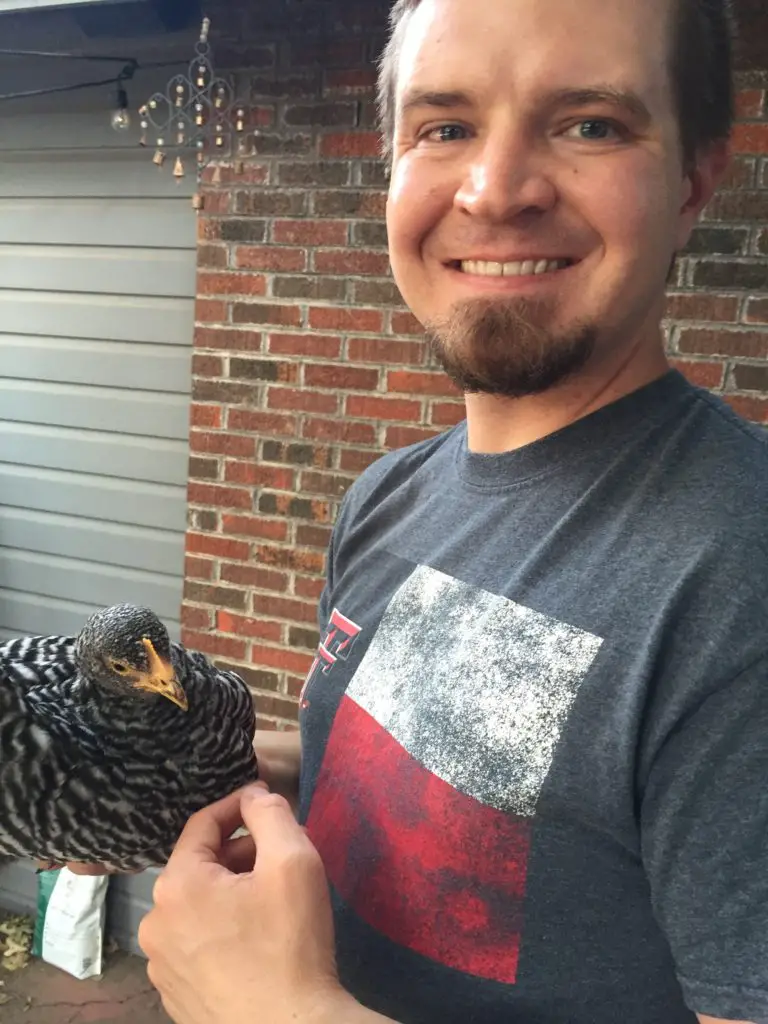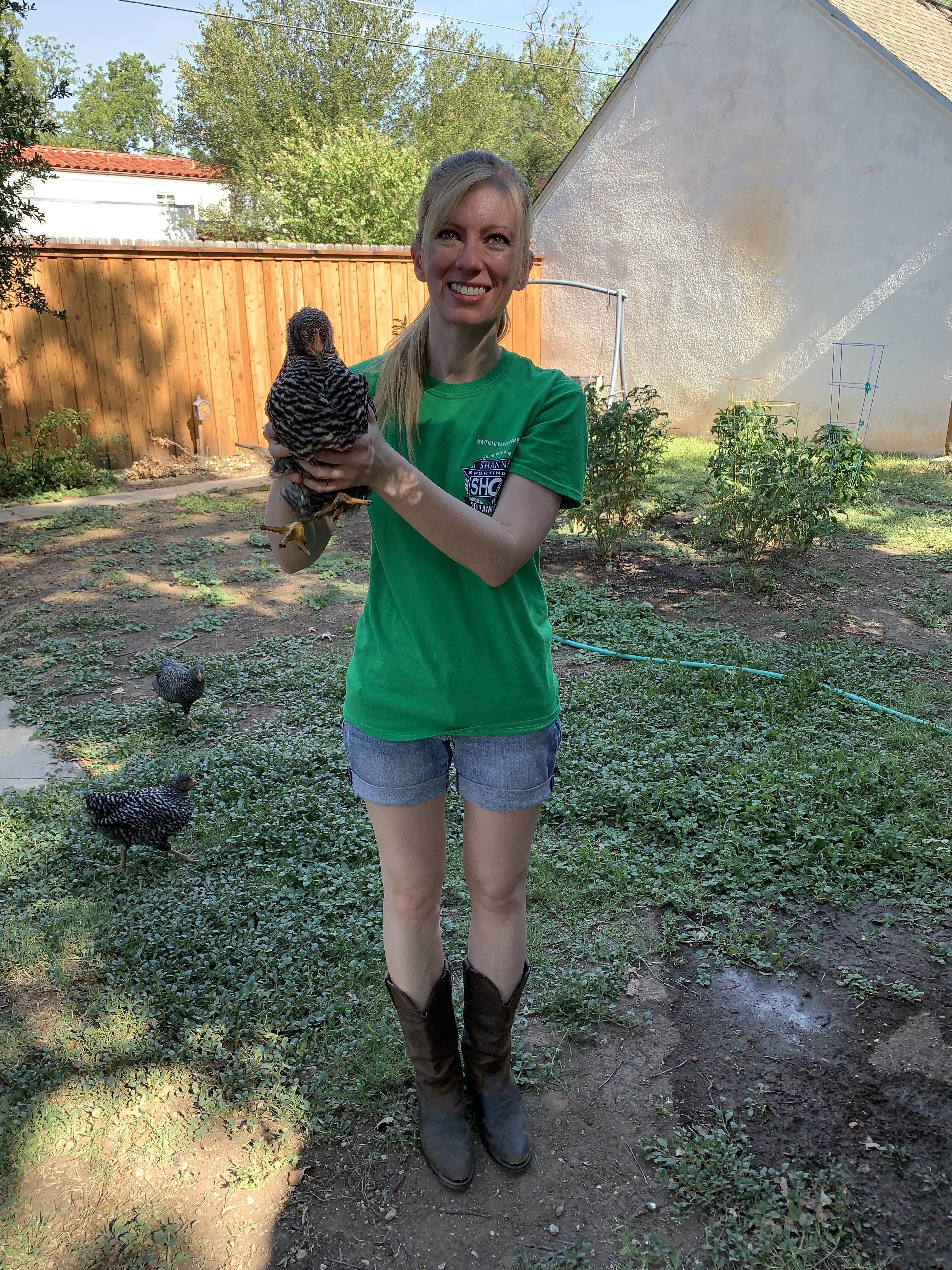When selecting a breed of chicken to raise as a beginner, you need to choose a breed that is relatively low maintenance, can handle the weather extremes in your climate, and is friendly to humans. Most chickens these days have been bred for egg production so this factor might be negligible in your decision. I am basing this article on my personal experience raising my flock from day old chicks to full grown layers in my backyard.
The Plymouth Rock is a dual-purpose chicken breed that originated in the United States in the 1850s. This breed of chicken is capable of handling extremes in weather, is an excellent layer, forages well, and has a friendly temperament. Plymouth Rocks come in various plumage colors, including barred, white, or black.
Keep reading to learn more about Plymouth Rocks and why I recommend them as the #1 breed for beginners.
The Plymouth Rock Chicken Breed
The Plymouth Rock chicken was created in the mid-1800s in Massachusetts using a combination of the Java, Brahma, Cochin, and Dominique breeds. This breed of chicken was designed to be an excellent layer, while also being a good meat chicken, which is why it is referred to as a dual-purpose breed. Plymouth Rock chickens are a quintessential chicken breed, found in many backyards and farms across America.
Plymouth Rocks are a heavy breed with hens averaging 6.5 pounds and rooters averaging 7.5 pounds. The bantam version of the Plymouth Rock weighs roughly 2.5 pounds.
Barred Plymouth Rocks have feathers with a barred pattern of dark gray, almost black, and white parallel bars. Plymouth Rocks can also come in black, white, buff, and Columbian. They have a red comb and wattle; bright yellow-orange beak; and yellow, featherless legs and feet. Their eyes are a bay, or reddish-brown color.
A Plymouth Rock chicken can lay between 200 to 280 eggs per year making then an excellent layer. Their eggs are large and will vary in shades of brown.
Low Maintenance
Plymouth Rock chickens are excellent for beginners since they are relatively low maintenance chickens.
All chickens will require daily care (see this post for more on the time and effort required for raising chickens), but Plymouth Rocks will not require extra care that is required for other breeds of chickens. For example, since Plymouth Rocks have featherless legs and feet, they will stay relatively clean in muddy conditions and will not require bathing, like a Silkie. When provided with access to dust bathing, Plymouth Rocks will be able to keep their feathers clean and glossy. Their medium sized comb is able to be tucked under the wings at night, which reduces the risk of frostbite during the winter.
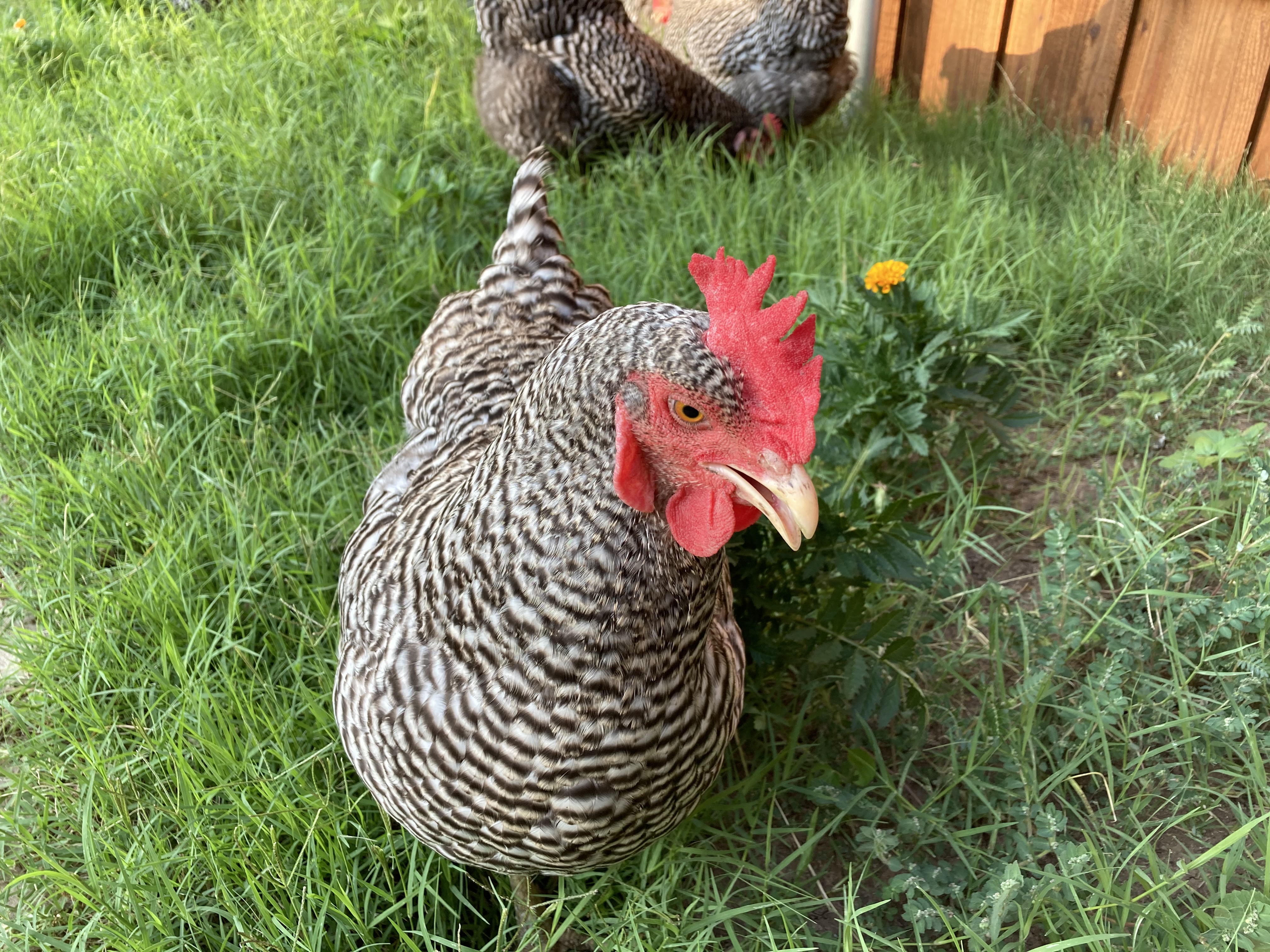
Plymouth Rock chickens are excellent foragers and, while the can be kept in a run for the majority of the time, they prefer to free range. When my Barred Rocks get to free range they are very focused on foraging certain areas of the yard, scratching and pecking very diligently. They especially love the area of bushes underneath the pecan trees since there are a lot of leaves to find bugs underneath.
Foraging is also a good behavior to reduce boredom in backyard chickens. Bored chickens can be aggressive to each other and loud, which is not good for neighborly relations. My chickens have a covered run measuring about 100 square feet and then an extended run that is uncovered that measures another 100 square feet. They will spend hours scratching and pecking the ground and love when I throw in sunflower seeds or weeds into their runs.
Handles Extremes in Weather
Plymouth Rocks are robust chickens that can handle extremes in weather. Their plumage is dense enough to keep them warm in the winter, while their combs are not so big that they are prone to frostbite. During the summer, the chickens are able to handle heat as long as they have access to plenty of shade since their dark feathers can absorb heat.
I live in Texas and saw a few people around town that had Plymouth Rock chickens. After doing some research, I decided that this breed would be robust enough to handle the hot summers of Texas. Last year, we a had a record breaking winter storm and the chickens handled the several days with below freezing temperatures like champs. During heavy rain, some of my chickens like to stand on a branch in their covered run and watch it rain, while others will go inside the coop. They are hearty chickens and have been able to handle the weather extremes in Texas just fine.
Excellent Layers
On average, Plymouth Rock chickens will lay between 200 to 280 eggs per year. Plymouth Rocks will typically start laying around 24 to 26 weeks of age and after about 2 or 3 years the rate of lay will reduce, similar to other breeds of chickens.
The eggs from a Plymouth Rock chicken are large and brown. The eggs will vary in color to some degree, with some eggs being a lighter color of brown and some may be speckled.
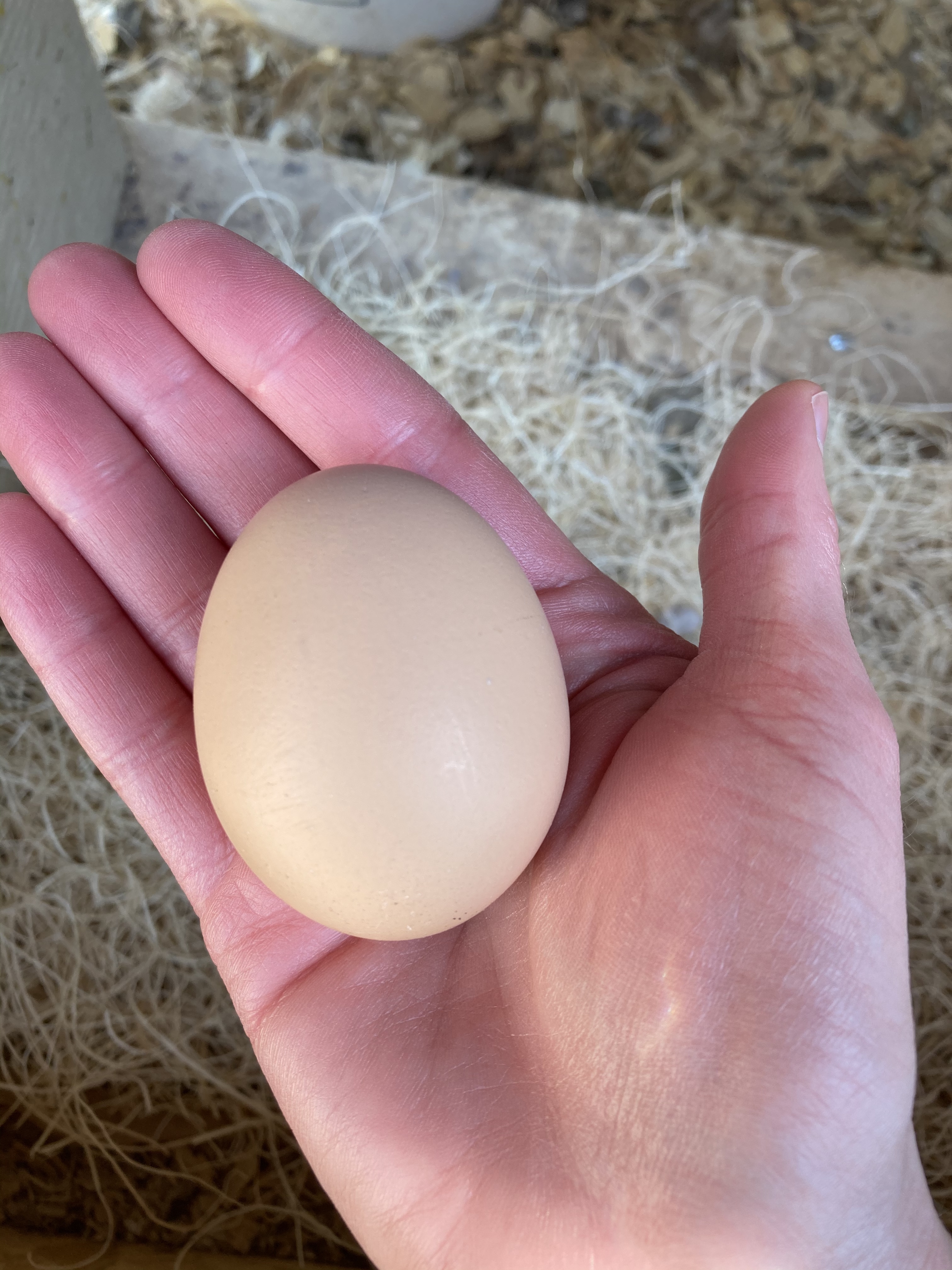
Perfect brown egg 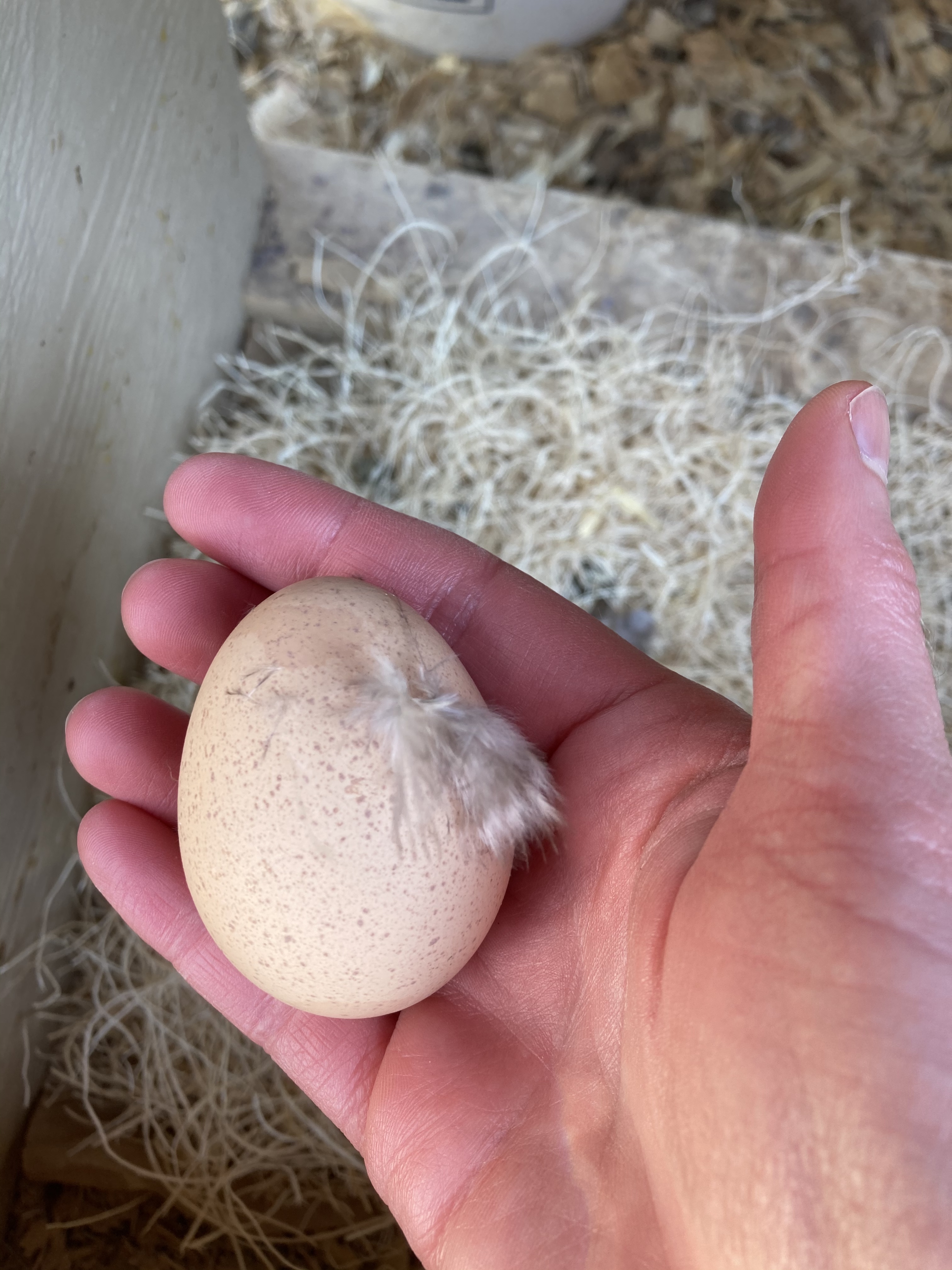
Brown egg with speckles (and a down feather)
Plymouth Rock hens can go broody and will spend time on their nests. If you might be interested in hatching eggs, some Plymouth Rock hens still have the natural instinct to sit on a clutch of eggs for 21 days until they hatch. Unfortunately, this trait has been bred out of most chickens these days since there are few people who will still raise chickens to have fertile eggs to be hatched.
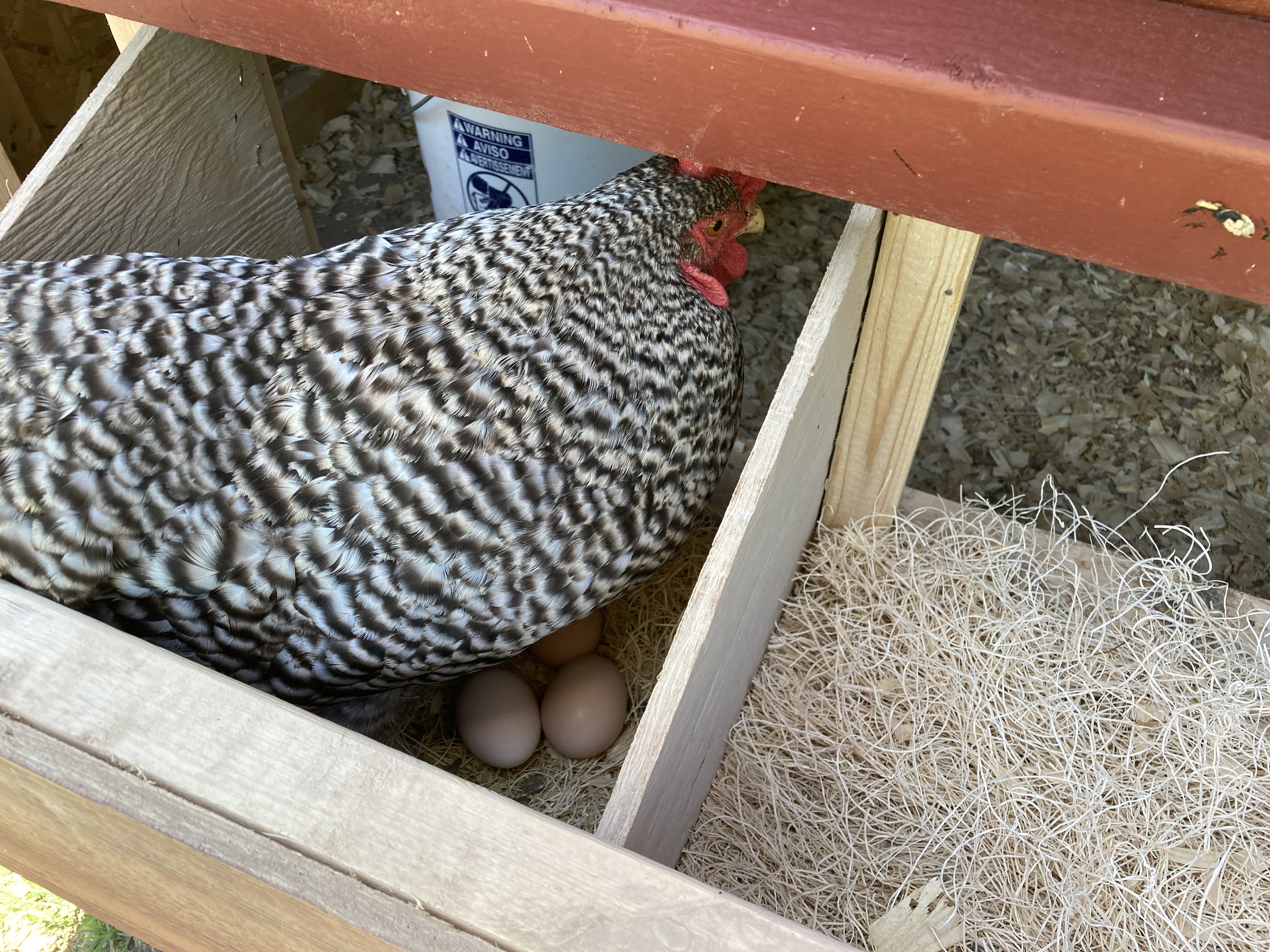
My Barred Plymouth Rock chickens were born on May 12. The first 2 chickens laid their first eggs on October 29. That’s exactly 24 weeks! The other chickens laid their first eggs over the course of the next 2 weeks.
My chickens will lay nearly every day of the week; I have 10 chickens and I will normally get about 9 eggs per day. They continued to lay throughout their first winter, although egg production did go down a bit. We went from about 9 eggs per day to about 7 eggs per day from 10 chickens.
Chickens produce an egg every 25 hours so they will not necessarily lay an egg every day if this cycle is projected to end after about 3:00 PM. For more information about a chicken's egg laying cycle, read How Many Eggs Can a Chicken Lay in One Day.
Friendly Temperament
Plymouth Rock chickens are friendly and enjoy being around their humans. This breed of chicken is chatty and they will give you chirps when they are happy, while scratching or pecking the ground, or they will squawk loudly when they need attention, like when I forgot to turn on their fan yesterday when it got hot outside.
While they are friendly chickens, they are not super affectionate and do not like to be held. We have one chicken, Miss Kay, who has been sweet from day one and has always let us hold her. As she’s gotten older, she doesn’t like it so much. While the chickens don’t like to be held, they do not mind being handled. Just be sure to be gentle and to not squeeze them tightly as this can suffocate them.
Plymouth Rock chickens are not known for being aggressive, roosters included. They have a placid temperament and get along with our cat, from a distance. I have noticed that when I spend more time with my chickens, they will let me handle them more and seem to be more tame when they receive more constant contact. Steven and I handled our chicks from the beginning but they are still animals and are not quite the same level of domestication as our cat, Quincey.
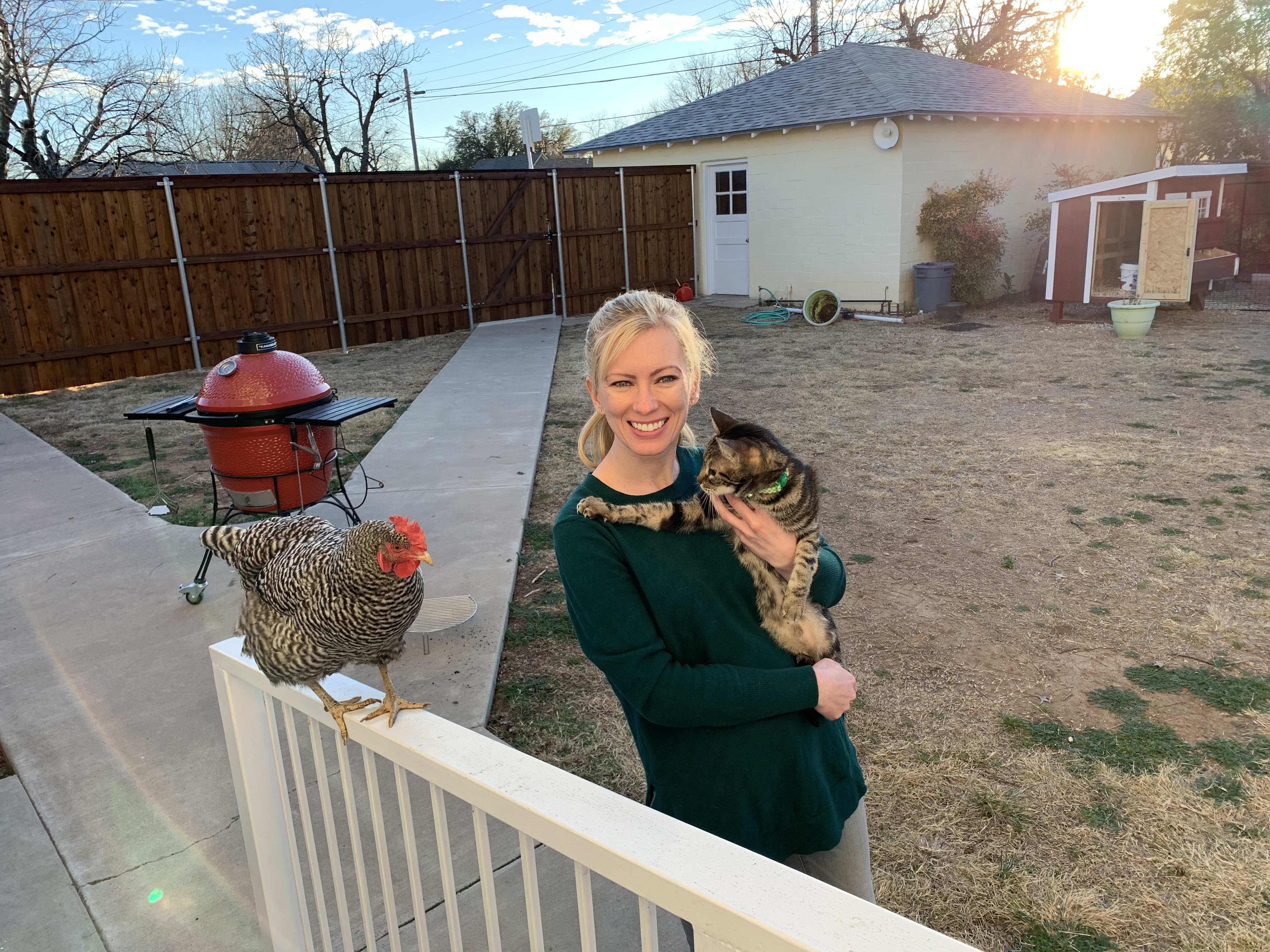
Given the average weight of a Plymouth Rock hen is 6.5 pounds, this breed of chicken is not likely to fly after it is full grown. Young chickens, or pullets, and bantams are more likely to take to the wing, while larger chickens will only take flight when they are excited or to fly over a fence. I wrote this post about keeping your chickens from flying since we did have a few chickens that liked flying when they were younger.
Naturally Camouflaged
The barred pattern of the Plymouth Rock’s feathers provide an excellent camouflage from predators. Some people believe that dark colored chickens are more difficult for an aerial predator to spot from the sky.
When my chickens are in a bush or in the shade, typically the only thing I can see is their yellow legs and maybe their yellowish-orange beak. Their red combs and wattles can blend in with the shade too. This is great for protecting themselves from predators.
Chickens will either fly into a low branch of a tree to protect themselves from ground predators or hide in bushes as protection from flying threats. My Plymouth Rock chickens were being stalked one day by a feral neighborhood cat and they were able to protect themselves by jumping in a bush and squawking loudly for me to come save them!
Intelligent
Chickens are intelligent animals, with intelligence levels comparable to that of a toddler. Chickens can understand the difference between “less” and “more,” with preference to “more” of something. This makes sense since chickens in numbers are safer and a patch of ground with more clover is better than less.
Plymouth Rock chickens are most likely just as intelligent as other breeds, but based on my personal experience, I think they are very smart (and entertaining). Take the following examples…
- One day I looked outside and one of my chickens casually walking around the outside of her run. I had no idea how she got out until I saw her crawl under the fencing to get back inside the run! The fencing had been up for a day before she learned how to escape. We’ve had other chickens escape this same fencing since then and when they hear either Steven or I call them down, they will run back to the fencing and crawl back to the right side.
- I needed to get inside the nesting boxes to collect eggs one day. There was on chicken sitting on the nest and it was super hot in the coop. I picked her up and carried her around to the coop and put her on the ground. She immediately ran to the other side of the run, rounded the corner, and ran up the ramp, right back to the same nesting box.
- Every morning when I open the chicken coop, there is one chicken that insists that I hand feed her. I’m not sure how this habit started or why, but her morning is not complete until she eats scratch or sunflower seeds out of my hand. She must be highly intelligent because she trained a human!
Based on my personal experience and research, I believe that Plymouth Rock chickens are the best breed for beginners. While my great-grandparents raised chickens on their farm, I had no exposure to chickens prior to getting our flock. When Steven and I got our 10 Barred Plymouth Rock chicks, it was a totally new experience for both of us, with lots of learning along the way. Before our chickens, the only animal we had was our cat, and we found raising these chickens to be comparable to having a cat.

